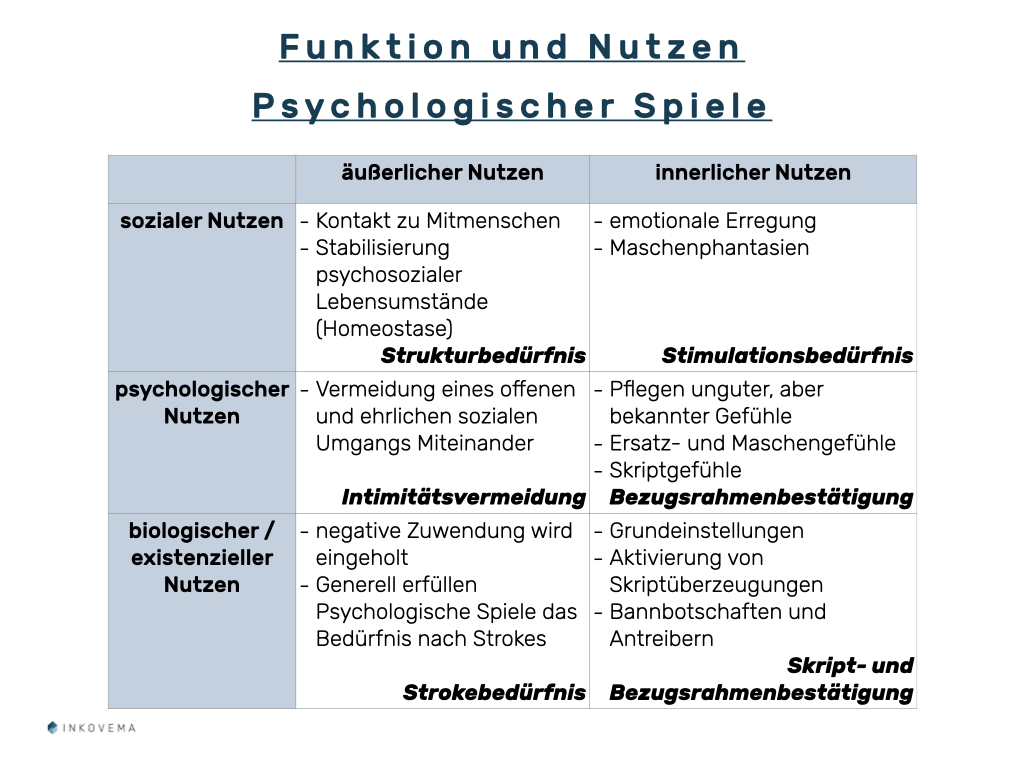The concept of psychological games in transactional analysis
Part 1: Basics
Definition, function and benefits, intensities and degrees of play
The psychological games are a Concept of transactional analysiswhich deals with communicative patterns of a manipulative nature. Most of these psychological games are destructive in nature. Eric Berne, the founder of transactional analysis, was instrumental in developing this concept and his – bestseller – Games People Play„ (1964) was instrumental in bringing about the early success of transactional analysis as a school of humanistic psychology.
A short series of articles on the psychological games of transactional analysis:
As a concept for Analysing transaction patterns it is a part of the Transactional analysis in the narrower sense. The term is not to be understood in an everyday or sporting sense, but is intended to emphasise the regularity and exemplary nature of communication processes.
1. definition
Berne said:
"A game consists of a continuous Consequence of hidden complementary transactions that lead to a very specific, predictable result…a periodically recurring sequence of frequently repeated transactions, seemingly plausible on the surface, yet dominated by hidden motives; Colloquially, it can also be described as a series of individual actions connected with a trap or a deceptive trick." (Adult games, p. 57)
I will go into more detail about Bernes' idea of psychological games in the course of this series of articles, but I would like to emphasise here that he defined the dual character of the transactions, the overt and covert levels of communication, as a decisive indication of a psychological game.
2. function and benefits
The function and benefits of psychological games are diverse, although they are often in the unconscious realm of the players. Nevertheless, benefits can be categorised and assigned to different dimensions:
There are
- one Social, communicative benefits, which relates to people's general need for structure and stimulation.
- one psychological, scripted benefit areato which the particularly formative forms of relationship formation can be assigned, which is often about intimacy avoidance and script confirmation, two special concepts of transactional analysis, which, however, cannot be deepened here – and
- the existential benefit area can be assigned to games that activate strokes and script patterns.
a. Benefits at the social level
The external benefits on a social level results from contact with fellow human beings. Contact is useful per se, even if it is not always valuable or emotionally safe. Last but not least, psychological games make it possible to spend the upcoming period of life in a structured way, which was a fundamental human issue for Berne. It is true that deep and meaningful feelings are longed for with psychological games. But even if they cannot be achieved in a fulfilling way, this is only because they exclude the associated risks.
The Internal benefits of the social level is reflected in the emotional arousal that games bring to players. Although the emotional arousal is by no means sufficient to satisfy the need for stimulation (satisfactorily), this is more a consequence of its covert, sometimes insidious generation than its intensity. Games compensate for the lack of openness that arises from fear of the consequences of honestly revealing one's needs.
b. Benefits on the psychological level
The External benefits on the psychological level is as follows: games serve to protect us from social contacts and situations in general that we would like to fear and avoid, without completely renouncing them. Rather, social contacts are organised in such a way that the need to communicate one's feelings of anger, fear and sadness, but also love, to others in an unadulterated way is avoided. Instead Substitute feelings offered. At the same time, shaping contact by means of psychological games should bring in that which alone promises an open relationship, an unvarnished, honest exchange of feelings, thoughts and behaviours that are based in the present.
The Inner benefits of the psychological level is to get hold of your known but unpleasant feelings, to cherish and nurture them. If open and honest contact is not possible, then at least proven negative interaction with others is.
c. Benefits on the existential level
The External benefits on a biological or existential level results from familiar, albeit unpleasant or even dangerous, ways of experiencing things. Strokes are "demanded" from others that are known and once had a life-stimulating effect and are now "supposed" to work again. The end of the game is usually characterised by negative attention through beatings, insults or psychological injuries. This is where the script, whose life-limiting beliefs are being reinforced, peeps out, which can be seen as Internal benefits of the games in existential terms represents. Players re-enact situations that were first performed in their family of origin and experienced as inadequate. These original scenes once became the basis of the script.
It therefore remains existential to revoke these assumptions, which are unsatisfactory or even dangerous in the present, and to follow new ones. Games then appear as the desperate attempt to finally resolve the error, to integrate missing experiences in order to be able to cope with current life processes. In this respect, psychological games represent "real mistakes" that need to be made in order to be able to recognise and integrate what is missing and thus become superfluous. The past, which is still effective, can be archived. This aspect is practically a redeeming existential benefit from games

2. game intensities and degrees of play
In his standard work, Eric Berne differentiated between game intensities and degrees of play. This is almost forgotten today.
While Berne uses the concept of „Intensity“ primarily describe the subjective state of mind and emotions of the players the concept of the „Grades“ of an assignment of objective stages of play. In this respect, it is a Escalation determination; to what extent have the players escalated their dynamic game situations, provoking momentous damage and scandals?
a) Game intensities
For Berne, the category of game intensity was one of three related quantitative variables for categorising games: Flexibility, tenacity and intensity.
- The Flexibility Berne served to describe the extent to which games can be performed flexibly in the social sphere; while the Tenacity (adhesiveness of microbes) is intended to describe the tenacity with which the players are committed to their „play instinct“. From today's perspective, both categories appear to be of little use.
- The situation is different with the concept of Intensitywhich Berne used to differentiate between tough, determined and aggressive players and more casual, laid-back players, which undoubtedly has an impact on the counselling situation.
b) Degrees
Degrees of play describe the escalating stages of a game. From the very beginning, transactional analysis Three stages or degrees of psychological games differentiated.
1. first-degree psychological game
A game of the first degree may sometimes be socially acceptable and is regarded as such in the circle of acquaintances of the acting author. little more than an interpersonal or social misstep.
2nd degree game
With a second-degree intensity of play, players want to maximise their Hiding the game and especially its outcome "from the eyes of the public (preferably)"although no serious or permanent damage need have occurred.
3rd degree game
Third-degree games, however, are final in nature. They are won by permanent illnesses, serious injuries and - last but not least - one's own death. For them, operating theatres, psychiatric wards, divorce and criminal courts and even mortuaries are therefore suitable stages for an appropriate production.





Leave A Comment